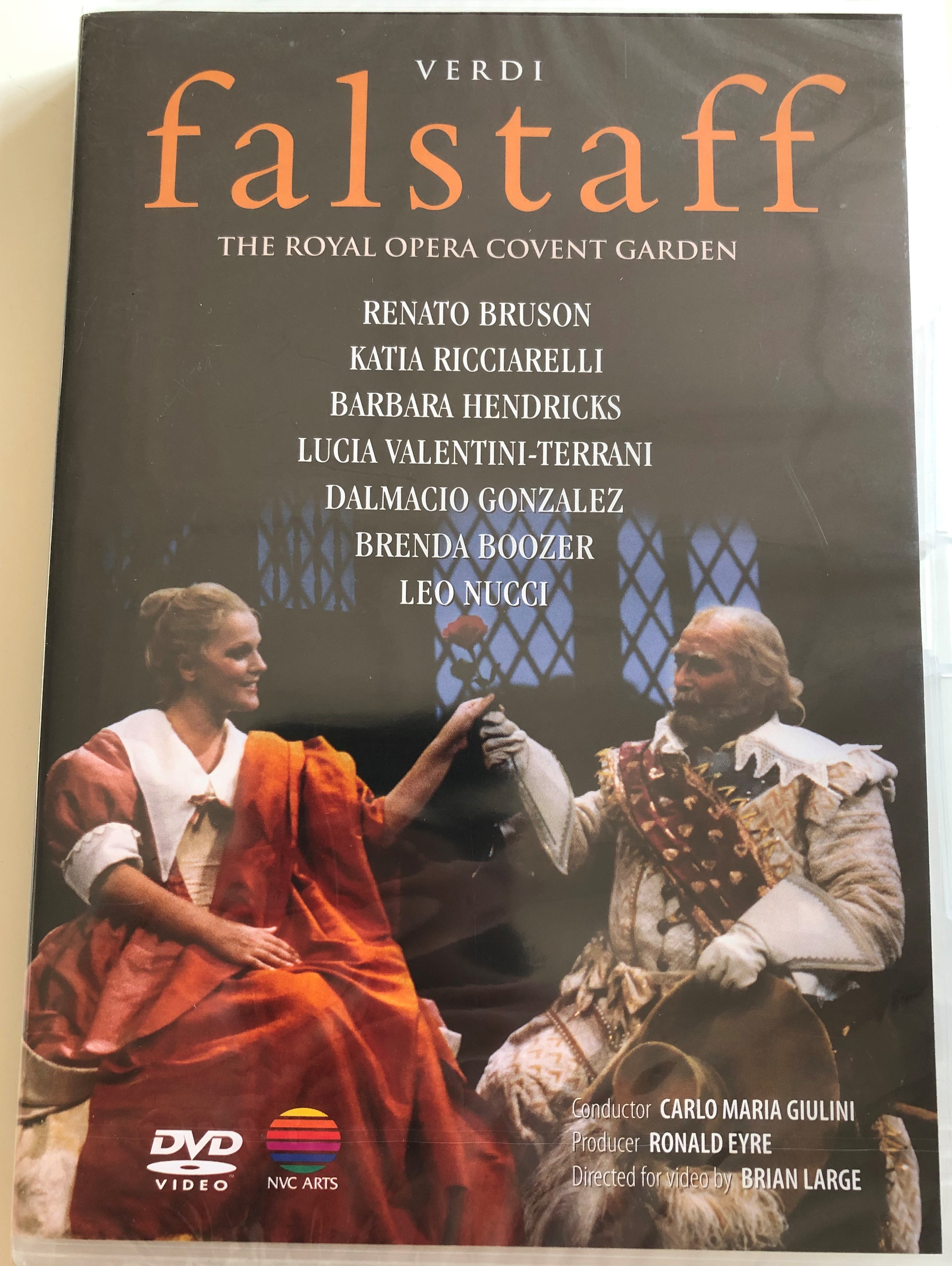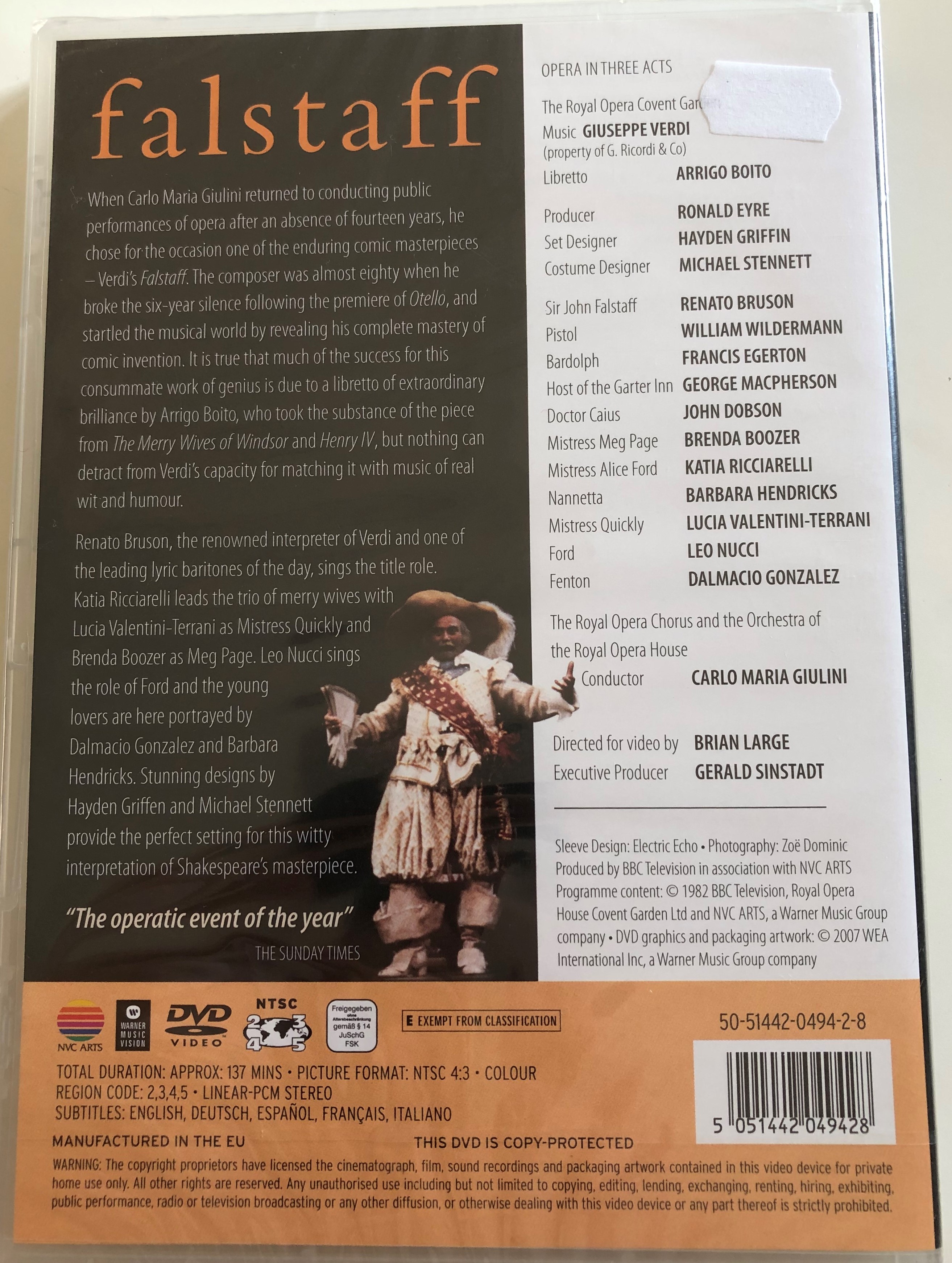Description
Verdi - falstaff DVD 1982 The Royal opera Covent Garden / Directed by Brian Large / Conducted by Carlo Maria Giulini / Libretto Arrigo Boito / NVC Arts
UPC 5051442049428
REGION 2-5 NTSC DVD
MADE IN HUNGARY
AUDIO:Linear-PCM Stereo 2.0
SUBTITLES: English, German, Spanish, French, Italian
Total Runtime: 137 minutes
English Summary:
Falstaff - opera in three acts (1893)
Giuseppe Verdi's opera 'Falstaff' performed by the Royal Opera Chorus and the Orchestra Of The Royal Opera House, Covent Garden. Katia Ricciarelli leads the three wives; Leo Nucci sings the part of Ford. Conducted by Carlo Maria Giulini. Sung in Italian.
Falstaff was the culmination of Verdi’s long career as an opera composer. He had talked of retirement after the premiere of Un Ballo in Maschera in 1858 and really did believe he had laid down his compositional pen after Aida in 1871. But nearly a decade later, persuaded by his publisher, he embarked on a rewriting of Simon Boccanegra which had been premiered in 1857. This involved his working with Arrigo Boito, an accomplished librettist and also a composer; it was an association Verdi came to relish. The revised Boccanegra was a success at La Scala in 1881 and showed that even at the age of 68 Verdi’s inner genius was alive and well. Ricordi and Boito subtly pointed Verdi towards Shakespeare’s Otello. Verdi loved and revered Shakespeare above any other poet.
Falstaff - Renato Bruson (baritone);
Alice Ford - Katia Ricciarelli (soprano);
Ford - Leo Nucci (baritone);
Meg Page - Brenda Boozer (mezzo);
Mistress Quickly - Lucia Valentina-Terrani (alto);
Nannetta - Barbara Hendricks (soprano);
Fenton - Dalmacio Gonzales (tenor);
Pistol - William Waldermann (bass);
Bardolph - Francis Egerton (tenor);
Dr. Caius - John Dobson (tenor)
Orchestra and Chorus of the Royal Opera House, Covent Garden, London/Carlo Maria Giulini
rec. live, Royal Opera House, Covent Garden, London, 1982
Producer: Ronald Eyre. Set design: Hayden Griffin. Costume design: Michael Stennett
Directed for TV and Video by Brian Large
Tracklist:
- Boozer, Brenda - Falstaff (Oper in 3 Akten) (Gesam
- Falstaff! Ola! (1. Akt: the Interior of the Garter
- So Che Se Andiam La Notte
- Ehi! Paggio! ...l'onore! Ladri!
- Alice, Meg, Nannetta
- Psst, Psst. Nannetta. Vien Qua
- Del Tuo Barbaro Diagnostico
- Siam Pentiti E Contriti (2. Akt: the Interior of T
- Signore, V'assista Il Cielo!
- E Sogno? O Realita?
- Presenteremo Un Bill
- Alfin T'ho Colto, Raggiante Fior
- Mia Signora! C'e Mistress Meg
- C'e! C'e! Se T'agguanto
- Eh! Taverniere! (3. Akt: Outside the Garter Inn)
- Reverenza. La Bella Alice
- T'aspettero Nel Parco Real
- Tu La Verde Sarai Ninfa Silvana
- Dal Labbro Il Canto
- Una, Due, Tre...
- Ninfe! Elfi! Silfi!
- Sul Fil D'un Soffio Etesio
- Alto La! Chi Va La?
- Ogni Sorta Di Gente
- Facciamo Il Parentado...tutto Nel Mondo
- (Keine Angaben) - Credits
Giuseppe Fortunino Francesco Verdi (Italian: [dʒuˈzɛppe ˈverdi]; 9 or 10 October 1813 – 27 January 1901) was an Italian opera composer. He was born near Busseto to a provincial family of moderate means, and developed a musical education with the help of a local patron. Verdi came to dominate the Italian opera scene after the era of Vincenzo Bellini, Gaetano Donizetti, and Gioachino Rossini, whose works significantly influenced him.
In his early operas, Verdi demonstrated a sympathy with the Risorgimento movement which sought the unification of Italy. He also participated briefly as an elected politician. The chorus "Va, pensiero" from his early opera Nabucco (1842), and similar choruses in later operas, were much in the spirit of the unification movement, and the composer himself became esteemed as a representative of these ideals. An intensely private person, Verdi, however, did not seek to ingratiate himself with popular movements and as he became professionally successful was able to reduce his operatic workload and sought to establish himself as a landowner in his native region. He surprised the musical world by returning, after his success with the opera Aida (1871), with three late masterpieces: his Requiem (1874), and the operas Otello (1887) and Falstaff (1893).






















